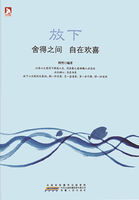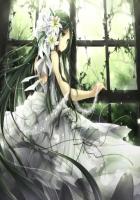There are dreadful little booths beside the path,for the sale of photographs and immortelles,I don't know what one is to do with the immortelles,where you are offered a brush dipped in tar to write your name withal on the rocks.Thousands of vulgar persons,of both sexes,and exclusively,it appeared,of the French nationality,had availed themselves of this implement;for every square inch of accessible stone was scored over with some human appellation.It is not only we in America,therefore,who besmirch our scenery;the practice exists,in a more organized form (like everything else in France),in the country of good taste.
You leave the little booths and stalls behind;but the bescribbled crag,bristling with human vanity,keeps you company even when you stand face to face with the fountain.This happens when you find yourself at the foot of the enormous straight cliff out of which the river gushes.It rears itself to an extraordinary height,a huge forehead of bare stone,looking as if it were the half of a tremendous mound,split open by volcanic action.The little valley,seeing it there,at a bend,stops suddenly,and receives in its arms the magical spring.I call it magical on account of the mysterious manner in which it comes into the world,with the huge shoulder of the mountain rising over it,as if to protect the secret.From under the mountain it silently rises,without visible movement,filling a small natural basin with the stillest blue water.The contrast between the stillness of this basin and the agitation of the water directly after it has overflowed,constitutes half the charm of Vaucluse.
The violence of the stream when once it has been set loose on the rocks is as fascinating and indescribable as that of other cataracts;and the rocks in the bed of the Sorgues have been arranged by a masterhand.
The setting of the phenomenon struck me as so simple and so fine the vast sad cliff,covered with the afternoon light,still and solid forever,while the liquid element rages and roars at its base that I had no difficulty in understanding the celebrity of Vaucluse.Iunderstood it,but I will not say that I understood Petrarch.He must have been very selfsupporting,and Madonna Laura must indeed have been much to him.
The aridity of the hills that shut in the valley is complete,and the whole impression is best conveyed by that very expressive French epithet morne.There are the very fragmentary ruins of a castle (of one of the bishops of Cavaillon)on a high spur of the mountain,above the river;and there is another remnant of a feudal habitation on one of the more accessible ledges.Having half an hour to spare before my omnibus was to leave (I must beg the reader's pardon for this atrociously false note;call the vehicle a diligence,and for some undiscoverable reason the offence is minimized),I clambered up to this latter spot,and sat among the rocks in the company of a few stunted olives.The Sorgues,beneath me,reaching the plain,flung itself crookedly across the meadows,like an unrolled blue ribbon.I tried to think of the amant de Laure,for literature's sake;but I had no great success,and the most I could,do was to say to myself that Imust try again.Several months have elapsed since then,and I am ashamed to confess that the trial has not yet come off.The only very definite conviction Iarrived at was that Vaucluse is indeed cockneyfied,but that I should have been a fool,all the same,not to come.















